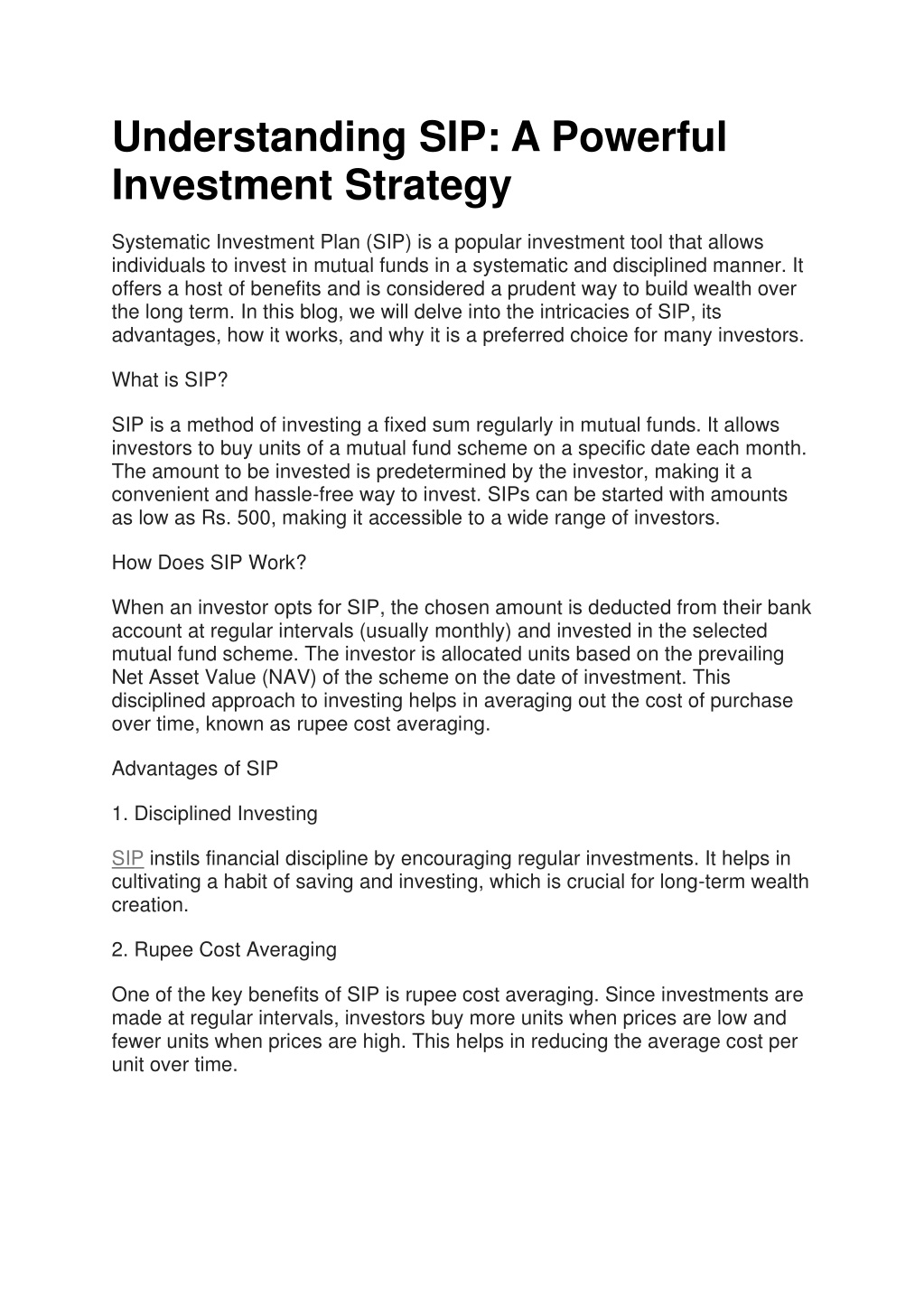
Understanding SIP
Systematic Investment Plan (SIP) is a popular investment tool that allows individuals to invest in mutual funds in a systematic and disciplined manner. It offers a host of benefits and is considered a prudent way to build wealth over the long term. In this blog, we will delve into the intricacies of SIP, its advantages, how it works, and why it is a preferred choice for many investors.
Download Presentation

Please find below an Image/Link to download the presentation.
The content on the website is provided AS IS for your information and personal use only. It may not be sold, licensed, or shared on other websites without obtaining consent from the author. If you encounter any issues during the download, it is possible that the publisher has removed the file from their server.
You are allowed to download the files provided on this website for personal or commercial use, subject to the condition that they are used lawfully. All files are the property of their respective owners.
The content on the website is provided AS IS for your information and personal use only. It may not be sold, licensed, or shared on other websites without obtaining consent from the author.
E N D
Presentation Transcript
Understanding SIP: A Powerful Investment Strategy Systematic Investment Plan (SIP) is a popular investment tool that allows individuals to invest in mutual funds in a systematic and disciplined manner. It offers a host of benefits and is considered a prudent way to build wealth over the long term. In this blog, we will delve into the intricacies of SIP, its advantages, how it works, and why it is a preferred choice for many investors. What is SIP? SIP is a method of investing a fixed sum regularly in mutual funds. It allows investors to buy units of a mutual fund scheme on a specific date each month. The amount to be invested is predetermined by the investor, making it a convenient and hassle-free way to invest. SIPs can be started with amounts as low as Rs. 500, making it accessible to a wide range of investors. How Does SIP Work? When an investor opts for SIP, the chosen amount is deducted from their bank account at regular intervals (usually monthly) and invested in the selected mutual fund scheme. The investor is allocated units based on the prevailing Net Asset Value (NAV) of the scheme on the date of investment. This disciplined approach to investing helps in averaging out the cost of purchase over time, known as rupee cost averaging. Advantages of SIP 1. Disciplined Investing SIP instils financial discipline by encouraging regular investments. It helps in cultivating a habit of saving and investing, which is crucial for long-term wealth creation. 2. Rupee Cost Averaging One of the key benefits of SIP is rupee cost averaging. Since investments are made at regular intervals, investors buy more units when prices are low and fewer units when prices are high. This helps in reducing the average cost per unit over time.
3. Power of Compounding SIP harnesses the power of compounding by reinvesting the returns generated by the investments. Over time, this compounding effect can significantly boost the overall returns on investment. 4. Flexibility SIPs offer flexibility in terms of investment amount, frequency, and choice of funds. Investors can increase, decrease, or pause their SIPs as per their financial goals and market conditions. 5. Diversification By investing in mutual funds through SIPs, investors gain exposure to a diversified portfolio of securities across various asset classes. This helps in spreading risk and potentially enhancing returns. Why Choose SIP? 1. Long-Term Wealth Creation SIP is ideal for investors looking to create wealth over the long term. By staying invested through market ups and downs, investors can benefit from the power of compounding and generate attractive returns. 2. Cost-Effective SIPs are a cost-effective way to invest in mutual funds as they allow for investing small amounts regularly without incurring a hefty initial investment. 3. Mitigates Market Volatility Since investments are spread out over time, SIPs help in mitigating the impact of market volatility. Investors are less exposed to the risk of making lump-sum investments at market peaks. 4. Goal-Based Investing SIPs are well-suited for achieving financial goals such as buying a house, funding education, or planning for retirement. By setting specific investment objectives, investors can align their SIPs with their goals. Conclusion In conclusion, SIP is a powerful investment strategy that offers a host of benefits to investors. By fostering financial discipline, leveraging rupee cost
averaging, harnessing the power of compounding, and providing flexibility and diversification, SIPs serve as an effective tool for wealth creation. Whether you are a novice investor or a seasoned one, incorporating SIPs into your investment portfolio can help you achieve your financial goals and build a secure financial future.






















